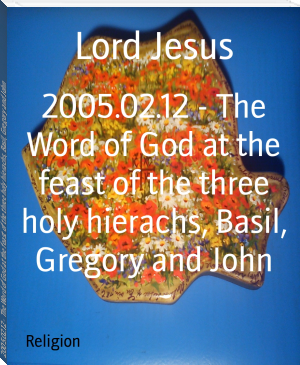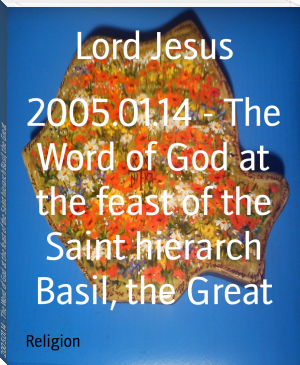The Book of Missionary Heroes by Basil Mathews (young adult books to read .txt) 📕

- Author: Basil Mathews
- Performer: -
Book online «The Book of Missionary Heroes by Basil Mathews (young adult books to read .txt) 📕». Author Basil Mathews
The Tahitians could not understand this strange worship, with no god that could be seen. But when the white fathers and mothers and children sang, the savages stood around with wonder and delight on their faces as they listened to the strange and beautiful sounds.
But the startling events of the day were not over. For out from the beach came a canoe across the bay, and in it two Swedish sailors, named, like some fishermen of long ago, Peter and Andrew. These white men knew some English, but lived, not as Christians, but as the natives lived.
And after them came a great and aged chief named Haamanemane.[14] This great chief went up to the "chief" of the ship, Captain Wilson, and called out to him "Taio."[15]
They did not know what this meant, till Peter the Swede explained that Haamanemane wished to be the brother—the troth-friend of Captain Wilson. They were even to change names. Captain Wilson would be called Haamanemane, and Haamanemane would be called Wilson.
So Captain Wilson said "Taio," and he and the chief, who was also high priest of the gods of Tahiti, were brothers.
Captain Wilson said to Haamanemane, through Peter, who translated each to the other:
"We wish to come and live in this island."
Haamanemane said that he would speak to the king and queen of Tahiti about it. So he got down again over the side of the vessel into the canoe, and the paddles of his boatman flashed as they swept along over the breakers to the beach to tell the king of the great white chief who had come to visit them.
All these things happened on the Sunday. On Tuesday word came that the king and the queen would receive them. So Captain Wilson and all his missionaries got into the whale-boat and pulled for the shore. The natives rushed into the water, seized the boat and hauled her aground out of reach of the great waves.
They were startled to see the king and queen come riding on the shoulders of men. Even when one bearer grew tired and the king or the queen must get upon another, they were not allowed to touch the ground. The reason was that all the land they touched became their own, and the people carried them about so that they themselves might not lose their land and houses by the king and queen touching them.
So at that place, under the palm trees of Tahiti, with the beating of the surf on the shore before them, and the great mountain forests behind, these brown islanders of the South Seas gave a part of their land to Captain Wilson and his men that they might live there.
The sons of the wild men of the North Sea Islands had met their first great adventure in bringing to the men of the South Sea Islands the story of the love of the Father of all.
[11] Ta-hee-tee.
[12] Too-bō-nă-ee.
[13] Mă-tă-vă-ee.
[14] Haa-mă-nāy-mă-này.
[15] Ta-ce-ō.
CHAPTER VI THE ISLAND BEACON FIRESPapeiha[16]
(Date of Incident, 1823)
The edge of the sea was just beginning to gleam with the gold of the rising sun. The captain of a little ship, that tossed and rolled on the tumbling ocean, looked out anxiously over the bow. Around him everywhere was the wild waste of the Pacific Ocean. Through day after day he had tacked and veered, baffled by contrary winds. Now, with little food left in the ship, starvation on the open ocean stared them in the face.
They were searching for an island of which they had heard, but which they had never seen.
The captain searched the horizon again, but he saw nothing, except that ahead of him, on the sky-line to the S.W., great clouds had gathered. He turned round and went to the master-missionary—the hero and explorer and shipbuilder, John Williams, saying:
"We must give up the search or we shall all be starved."
John Williams knew that this was true; yet he hated the thought of going back. He was a scout exploring at the head of God's navy. He had left his home in London and with his young wife had sailed across the world to the South Seas to carry the Gospel of Jesus Christ to the people there. He was living on the island of Raiatea: but as he himself said, "I cannot be confined within the limits of a single reef." He wanted to pass on the torch to other islands. So he was now on this voyage of discovery.
It was seven o'clock when the captain told John Williams that they must give up the search.
"In an hour's time," said Williams, "we will turn back if we have not sighted Rarotonga."
So they sailed on. The sun climbed the sky, the cool dawn was giving way to the heat of day.
"Go up the mast and look ahead," said Williams to a South Sea Island native. Then he paced the deck, hoping to hear the cry of "Land," but nothing could the native see.
"Go up again," cried Williams a little later. And again there was nothing. Four times the man climbed the mast, and four times he reported only sea and sky and cloud. Gradually the sun's heat had gathered up the great mountains of cloud, and the sky was clear to the edge of the ocean. Then there came a sudden cry from the masthead:
"Teie teie, taua fenua, nei!"[17]
"Here, here is the land we have been seeking."
All rushed to the bows. As the ship sailed on and they came nearer, they saw a lovely island. Mountains, towering peak on peak, with deep green valleys between brown rocky heights hung with vines, and the great ocean breakers booming in one white line of foaming surf on the reef of living coral, made it look like a vision of fairyland.
They had discovered Rarotonga.
But what of the people of the island?
They were said to be cannibals.
Would they receive the missionaries with clubs and spears? Who would go ashore?
On board the ship were brown South Sea men from the island where John Williams lived. They had burned their idols, and now they too were missionaries of Jesus Christ. Their leader was a fearless young man, Papeiha. He was so daring that once, when everybody else was afraid to go from the ship to a cannibal island, he bound his Bible in his loin cloth, tied them to the top of his head, and swam ashore, defying the sharks, and unafraid of the still more cruel islanders.
So at Rarotonga, when the call came, "Who will go ashore?" and a canoe was let down from the ship's side, two men, Papeiha and his friend Vahineino,[18] leapt into it. Those two fearlessly paddled towards the shore, which was now one brown stretch of Rarotongans crowded together to see this strange ship with wings that had sailed from over the sea's edge.
The Rarotongans seemed friendly; so Papeiha and Vahineino, who knew the ways of the water from babyhood and could swim before they could walk, waited for a great Pacific breaker, and then swept in on her foaming crest. The canoe grated on the shore. They walked up the beach under the shade of a grove of trees and said to the Rarotongan king, Makea,[19] and his people:
"We have come to tell you that many of the islands of the sea have burned their idols. Once we in those islands pierced each other with spears and beat each other to death with clubs; we brutally treated our women, and the children taken in war were strung together by their ears like fish on a line. To-day we come—before you have destroyed each other altogether in your wars—to tell you of the great God, our Father, who through His Son Jesus Christ has taught us how to live as brothers."
King Makea said he was pleased to hear these things, and came in his canoe to the ship to take the other native teachers on shore with him. The ship stood off for the night, for the ocean there is too deep for anchorage.
Papeiha and his brown friends, with their wives, went ashore. Night fell, and they were preparing to sleep, when, above the thud and hiss of the waves they heard the noise of approaching crowds. The footsteps and the talking came nearer, while the little group of Christians listened intently. At last a chief, carried by his warriors, came near. He was the fiercest and most powerful chief on the island.
When he came close to Papeiha and his friends, the chief demanded that the wife of one of the Christian teachers should be given to him, so that he might take her away with him as his twentieth wife. The teachers argued with the chief, the woman wept; but he ordered the woman to be seized and taken off. She resisted, as did the others. Their clothes were torn to tatters by the ferocious Rarotongans. All would have been over with the Christians, had not Tapairu,[20] a brave Rarotongan woman and the cousin of the king, opposed the chiefs and even fought with her hands to save the teacher's wife. At last the fierce chief gave in, and Papeiha and his friends, before the sun had risen, hurried to the beach, leapt into their canoe and paddled swiftly to the ship.
"We must wait and come to this island another day when the people are more friendly," said every one—except Papeiha, who never would turn back. "Let me stay with them," said he.
He knew that he might be slain and eaten by the savage cannibals on the island. But without fuss, leaving everything he had upon the ship except his clothes and his native Testament, he dropped into his canoe, seized the paddle, and with swift, strong strokes that never faltered, drove the canoe skimming over the rolling waves till it leapt to the summit of a breaking wave and ground upon the shore.
The savages came jostling and waving spears and clubs as they crowded round him.
"Let us take him to Makea."
So Papeiha was led to the chief. As he walked he heard them shouting to one another, "I'll have his hat," "I'll have his jacket," "I'll have his shirt."
At length he reached the chief, who looked and said, "Speak to us, O man, that we may know why you persist in coming."
"I come," he answered, looking round on all the people, "so that you may all learn of the true God, and that you, like all the people in the far-off islands of the sea, may take your gods made of wood, of birds' feathers and of cloth, and burn them."
A roar of anger and horror burst from the people. "What!" they cried, "burn the gods! What gods shall we then have? What shall we do without the gods?"
They were angry, but there was something in the bold face of Papeiha that kept them from slaying him. They allowed him to stay, and did not kill him.
Soon after this, Papeiha one day heard shrieking and shouting and wild roars as of men in a frenzy. He saw crowds of people round the gods offering food to them; the priests with faces blackened with charcoal and with bodies painted with stripes of red and yellow, the warriors with great waving head-dresses of birds' feathers and white sea-shells. Papeiha, without taking any thought of the peril that he rushed into,





Comments (0)